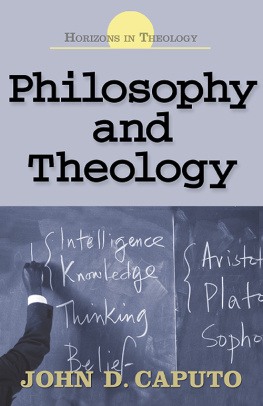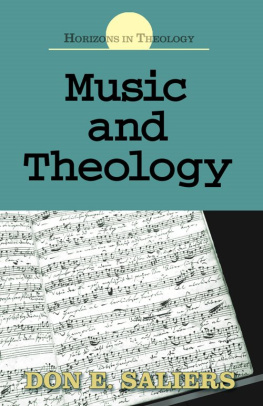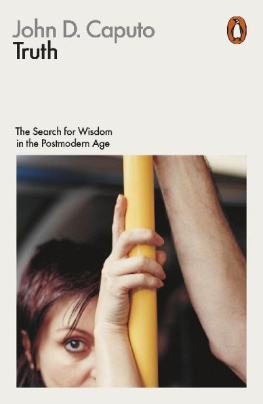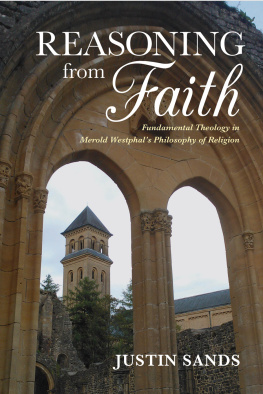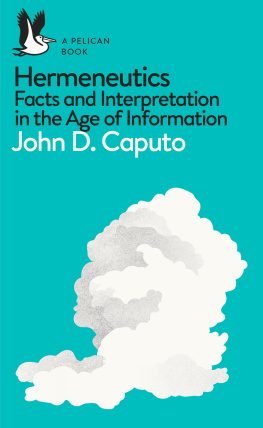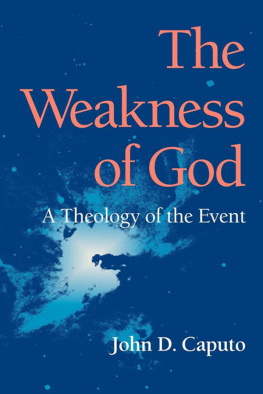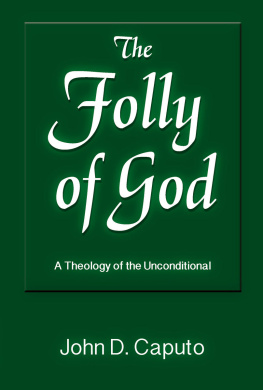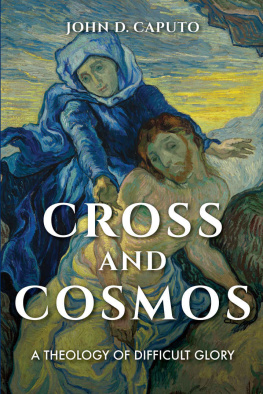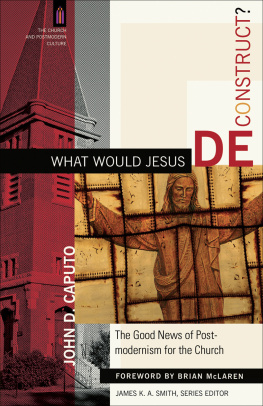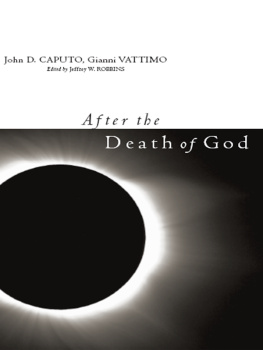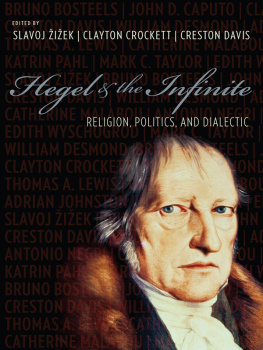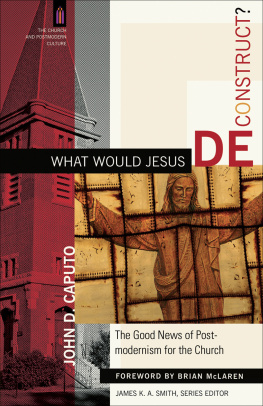P R A I S E F O R J O H N C A P U T O ' S P H I L O S O P H Y A N D T H E O L O G Y
"I meant to take a quick glance at Jack Caputo's new book but then couldn't put it down. It's rare for a theologian to be interesting, and rarer for a philosopher perhaps, but this book is full of intriguing insights expressed through sparkling proseprofound, delightful, and downright inspiring."
Brian McLaren, author/activist (anewkindofchristian.com)
"Imagine a book in which Augustine of Hippo and Jacques Derrida are co-cupids, each aiming their arrows at your heart. Only in the hands of Jack Caputo would this be imaginable. This is a lyrical, incredible, impossible gem of a book. Caputo sings, preaches, waxes philosophic and theologic, and ultimately brings us into the presence of two giantsAugustine and Derrida each at prayer; what surprises us is that they're praying together. And, if we read carefully, we'll see that this little book is, in fact, Caputo's own prayer. I will read this volume many times."
Tony Jones, national coordinator of Emergent-US and author of The Sacred Way
"Here once again the author shows with typical brio, gusto, and caputo (to coin a phrase) that philosophy and theology are like two twins engaged in loving and creative combat. The style is crisp, the arguments concise, the conclusions lucid and arresting. This pioneering book is accessible to both academic and nonacademic readers alike. Passionate reading at its best."
Richard Kearney, Boston College
"Elegant, clear, and provocative, John D. Caputo's Philosophy and Theology adds a new twist to a debate as old as the West itself. Still the father of the Philosophy of Religion, in its continental register in America, Caputo has also become its main gadfly."
Kevin Hart, The University of Notre Dame
"In searching for a text introducing students into the rich dialogue between philosophy and theology, there is no better find than John Caputo's Philosophy and Theology. Several pages into Caputo's text, one realizes that we are receiving far more than an introduction. This concise and accessible text stands on its own as a primary text, revealing the wisdom and passion of a scholar who presses through traditional boundaries to new ends. While providing students a new way of thinking about the relationship between philosophy and theology, Caputo offers his own breathtaking theological meditation in the same line as the great thinkers that he engages."
Shelly Rambo, Boston University
"Philosophy and Theology is a remarkable little essay, at the same time wide-ranging and deep, simple yet profound. It is beautifully written, witty, and compelling, recounting the changing relationship of theology and philosophy throughout history. . . . This gem of a book is a must read for every budding philosopher and theologianindeed, for every practicing philosopher and theologian."
James H. Olthuis, Professor Emeritus of Philosphical Theology, Institute for Christian Studies, Toronto
"By bringing to light the intimacy between the seemingly independent domains of philosophy and theology, Caputo dispels a still widely held belief that 'religious people have checked their rational faculties at the door.' With humor and verve, he tracks the history of their relation from its pre-modern expressions to the radical shifts imposed by the role of science in establishing new rules of thought. The Enlightenment may have provided a necessary corrective to the rationality that shored up religious narratives, but Caputo shows how postmodernity allows for the return of passion and prayer in human existence....Numerous original works have established John D. Caputo as a significant original thinker and an interpreter of the philosophical tradition. The present book is indispensable for both those seeking entre to and those already familiar with this terrain."
Edith Wyschogrod, J. Newton Rayzor Professor Emerita, Rice University
"Just as Socrates claimed 'the unexamined life is not worth living' so too, it may be said, that the unexamined theology may not be worth believing. In this brief but provocative work, Caputo urges both philosophers and theologians to reexamine their search for truth, meaning, and beauty, and in so doing, demonstrates why, now more than ever, both must be prepared to listen and learn from one another."
Ronald P. Mahurin, Vice President, Council for Christian Colleges and Universities
"What hath Nietzsche to do with Augustine? In this book, one of the most influential figures in continental philosophy of religion offers a provocativeand entertainingpostmodern rendition of the enduring question: What does Athens have to do with Jerusalem? Caputo provides an enlightening excursion through the history of philosophy and theology, all the while with an eye on our postmodern situation. . . . [H]is engaging proposal will provoke students to think long and hard about these perennial questions."
James K. A. Smith, Calvin College
HORIZONS IN THEOLOGY
______________________________
Philosophy
and
Theology
JOHN D.CAPUTO
Abingdon Press
Nashville
PHILOSOPHY AND THEOLOGY
Copyright 2006 by Abingdon Press
All rights reserved.
No part of this work may be reproduced or transmitted in any form or by any means, electronic or mechanical, including photocopying and recording, or by any information storage or retrieval system, except as may be expressly permitted by the 1976 Copyright Act or in writing from the publisher. Requests for permission can be addressed to Abingdon Press, P.O. Box 801, 201 Eighth Avenue South, Nashville, TN 37202-0801, or e-mailed to permissions@abingdonpress.com.
This book is printed on acid-free paper.
Library of Congress Cataloging-in-Publication Data
Caputo, John D.
Philosophy and theology / John D. Caputo.
p. cm.
ISBN 0-687-33126-9 (pbk. : alk. paper)
Philosophy. Theology. I. Title.
B29.C2745 2006
261.5'1dc22
2005030356
All scripture quotations unless noted otherwise are taken from the New Revised Standard Version of the Bible, copyright 1989, by the Division of Christian Education of the National Council of the Churches of Christ in the United States of America. Used by permission. All rights reserved.
Scripture quotations marked KJV are from the King James or Authorized Version of the Bible.
06 07 08 09 10 11 12 13 14 1510 9 8 7 6 5 4 3 2 1
MANUFACTURED IN THE UNITED STATES OF AMERICA
C ONTENTS
I N T R O D U C T I O N
I n a passage that has always remained with me, the young Friedrich Nietzsche envisaged the following scene. Once upon a time, on a little star in a distant corner of the universe, clever little animals invented for themselves proud words, like truth and goodness. But soon enough the little star cooled, and the little animals had to die and with them their proud words. But the universe, never missing a step, drew another breath and moved on, dancing its cosmic dance across endless skies.
Has Nietzsche described our fate? Does anyone know we are here? Or care? Does a faith in God relieve us of the horror of this scene once and for all? Or is this scene inescapable, not because it can be firmly established as the final truth, but because it remains a possibility that haunts and menaces faith like a ghost? And in constantly menacing faith, does this eerie scene in fact help to constitute faith as faith, which does not see in whole but only in part?

